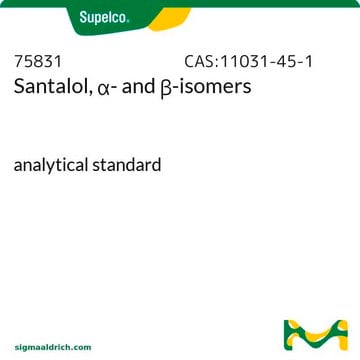SML3258
3-Methyl-5-(2,2,3-trimethyl-3-cyclopentenyl)pentan-2-ol
≥90% (GC)
Sinónimos:
3-Methyl-5-(2,2,3-trimethylcyclopent-3-en-1-yl)pentan-2-ol
About This Item
Productos recomendados
Quality Level
assay
≥90% (GC)
form
oil
color
white to beige
storage temp.
−20°C
SMILES string
CC1=CCC(CCC(C)C(C)O)C1(C)C
InChI
1S/C14H26O/c1-10(12(3)15)6-8-13-9-7-11(2)14(13,4)5/h7,10,12-13,15H,6,8-9H2,1-5H3
InChI key
NGYMOTOXXHCHOC-UHFFFAOYSA-N
Biochem/physiol Actions
hcodes
pcodes
Hazard Classifications
Aquatic Chronic 2
Storage Class
10 - Combustible liquids
wgk_germany
WGK 2
Certificados de análisis (COA)
Busque Certificados de análisis (COA) introduciendo el número de lote del producto. Los números de lote se encuentran en la etiqueta del producto después de las palabras «Lot» o «Batch»
¿Ya tiene este producto?
Encuentre la documentación para los productos que ha comprado recientemente en la Biblioteca de documentos.
Nuestro equipo de científicos tiene experiencia en todas las áreas de investigación: Ciencias de la vida, Ciencia de los materiales, Síntesis química, Cromatografía, Analítica y muchas otras.
Póngase en contacto con el Servicio técnico




![1,3,4,6,7,8-Hexahydro-4,6,6,7,8,8-hexamethylcyclopenta[g]-2-benzopyran analytical standard](/deepweb/assets/sigmaaldrich/product/structures/388/630/32c6a671-64a6-4e33-9e15-ec3e0a11ff3d/640/32c6a671-64a6-4e33-9e15-ec3e0a11ff3d.png)



